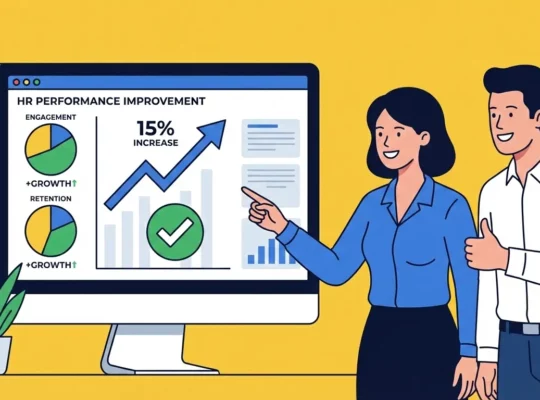The significance of employee reviews is on the rise, reshaping how candidates perceive organizations and make career choices. These reviews greatly influence employer branding, playing a pivotal role in attracting and retaining talent. This article aims to equip HR professionals and talent acquisition specialists like you with the strategies needed to effectively utilize company employee reviews.
For HR and talent acquisition professionals, understanding the impactful nature of internal sentiment is critical. When managed and used correctly, it can be a huge value add to your long term company success.
Why Employee Reviews Matter:
Your role relies heavily on the perception others have of your work environment, this is why taking employee reviews seriously is vital. There are multiple reasons as to why these reviews are important, here are a few.
- Enhance Employer Branding: Positive company reviews showcase your work environment, attracting potential candidates who align with your values and culture.
- Improve Recruiting Efficiency: Understanding what matters to employees allows you to tailor your recruitment strategies, saving time and resources.
- Attract Top Talent: Candidates seek authentic insights into a workplace before committing. Favorable remarks are a magnet for high-caliber individuals.
- Reduce Employee Turnover: By addressing concerns raised in employer reviews, you foster a more supportive environment, increasing employee retention.
Diving into the Data: What You Can Learn
These reviews offer a wealth of information about various aspects of your company, offering insights not readily available through traditional HR metrics.
- Company Culture: Gauging the Employee Experience – delve into the essence of employee sentiment with valuable insight, the insights provide an invaluable perspective on the day-to-day realities of working at your organization. Discover how they really feel.
- Salary Expectations: Fair Compensation – are you paying enough? Understanding current rates enables you to offer competitive packages.
- Work-Life Balance: How employees perceive work-life harmony – Is your team too stressed? Assess your staffs sentiment surrounding flexible working and other perks.
- Benefits and Perks: Uncovering competitive advantages – What kind of incentives are most valued by your candidates? Learn what the most important elements are to your employees.
- Management Styles: Identifying Leadership Strengths and Weaknesses – Are your leaders equipped to handle their teams? Discover what qualities leaders are showcasing and what they need to improve on.
- Career Opportunities: Showcasing paths to advancement – Do your staff feel they have room to advance within your organization? Do they see a long term journey?
Analyzing & Interpreting Employee Reviews: Separating Signal from Noise
Extracting meaningful insights from employee reviews requires a discerning eye. Not every review is created equal, and it’s crucial to differentiate between genuine feedback and potential bias.
The Art of Reading Between the Lines:
Move past initial impressions, to truly grasp the sentiments conveyed in the reviews. There are ways to fully understand what is being said.
- Recognizing patterns and trends across multiple reviews is the first step in understanding the overall perception of your workplace.
- Identifying common themes and areas for improvement pinpoints specific issues that need addressing.
- Understanding the ‘Pros’ and ‘Cons’ sections provides a balanced view of what the company does well and where it falls short.
Detecting Potential Bias or Inauthenticity:
Skepticism is healthily placed when it comes to reviews written about a workplace. Some may be less than genuine.
- Considering the source and potential incentives helps you assess the credibility of the review.
- Analyzing the tone and language used in reviews can reveal whether the feedback is genuine or manufactured.
- Looking for overly positive or negative reviews may indicate that the review is not entirely truthful.
Key Indicators of Genuine Feedback
A genuine and helpful employee feedback usually includes specific details about the staff’s experience.
- Specific examples and anecdotes lend credibility to the review and provide concrete evidence to support the writer’s claims.
- Balanced perspectives are essential, offering both positive and constructive criticism.
- Consistent messaging across multiple reviews from different time periods suggests that the issues being raised are systemic and require attention.
Using Employee Reviews to Improve Company Culture and Practices
Company employee reviews are much more than just a collection of opinions; they’re a roadmap for enhancing your workplace.
Actionable Insights for HR Initiatives:
Turning employee feedback into tangible improvements demonstrates your commitment to creating a better workplace. Address any problems to create a more positive work environment.
- Addressing negative feedback regarding work-life balance can involve offering flexible work arrangements or increasing vacation time.
- Revamping benefits packages based on employee suggestions can include adding new perks or improving existing ones.
- Implementing leadership development programs to address management concerns can equip leaders with the skills and tools they need to succeed.
Enhancing the Employee Experience:
The objective is to make the workplace more attractive to future hires. Create an environment that staff want to be in and are happy to recommend.
- Creating a more transparent and open work environment fosters trust and encourages open communication.
- Promoting a culture of feedback and continuous improvement demonstrates your values and dedication, encourage constructive criticism.
Practical Steps to Take with Employee Review Data
Monitoring these platforms enables you to stay informed about employee sentiment (both positive and negative).
- Regularly monitor and analyze reviews across multiple platforms to stay informed about employee sentiment.
- Share key findings with relevant stakeholders (management, department heads) to ensure that everyone is aware of the issues that need to be addressed.
- Develop and implement action plans to address identified issues and track progress over time.
Leveraging Employee Reviews in Talent Acquisition
In any industry, competition is high. Employee feedback can make or break a recruitment, and also helps you to understand the right candidates to hire.
Attracting Qualified Candidates:
Showcasing the positive aspects of your company culture and employee satisfaction is essential for attracting top talent. If your own team enjoy where they work, make sure your candidates know.
- Showcasing positive company culture and employee satisfaction attracts like-minded individuals.
- Highlighting opportunities for professional development and career advancement appeals to ambitious candidates.
- Using reviews to address common candidate concerns (salary, benefits, work-life balance) demonstrates transparency.
Improving the Interview Process:
By highlighting key perks and benefits, you are able to entice potential candidates to join, and also give them an insight into the company.
- Informing interview questions based on common themes in reviews can help you assess whether a candidate is a good fit for the company.
- Prepare interviewees with current data found on company employee review sites, so they know what to expect.
- Providing candidates with realistic expectations about the company’s culture and work environment can help prevent them from being disappointed later on.
Strategic Recruitment Messaging
Promote your company through your reviews. Your messaging and branding should showcase what makes your company a safe and healthy place to work.
- Emphasize the company’s commitment to employee well-being by highlighting related initiatives and programs.
- Highlight specific benefits and perks that are valued by employees, such as flexible work arrangements, generous vacation time, or professional development opportunities.
- Showcase examples of employee success stories and career growth to demonstrate that the company is invested in employee development.
Navigating Employer Review Sites as Strategic Tools
Employer review sites serve as valuable resources for both job seekers and HR professionals.
Exploring Key Features and Functionality:
These platforms offer a range of features designed to help you gather insights. It can be a one stop shop for understanding how your company is viewed.
- Searching for companies by location allows you to compare your company to competitors in your area.
- Filtering reviews by department or job title enables you to identify specific areas where improvements are needed.
- Using salary comparison tools to benchmark compensation helps you ensure that you are paying your employees fairly.
- Utilizing platforms that enable employees to confidently submit company reviews encourages honest feedback and transparency within the organization.
Evaluating Different Platforms:
Not all review sites are created equal. There are several different platforms, all offering different functions, and you need to understand which ones are best suited for your company.
- Considering the source’s reputation and trustworthiness is critical for ensuring that the information that you are relying on is accurate and unbiased.
- Assessing the site’s review moderation policies can help you determine whether the platform is committed to preventing fake or biased reviews.
- Comparing the features and functionalities of different platforms enables you to choose the one that best meets your needs.
Mitigating Risks and Maintaining Transparency
While the benefits of company employee reviews are undeniable, it’s essential to address potential risks and ensure transparency.
Addressing Negative Reviews Proactively:
It’s a good idea to always keep an eye on what is being said, and to engage with those reviews as much as possible.
- Developing a strategy for responding to negative feedback demonstrates that you are committed to addressing concerns.
- Demonstrating a commitment to addressing concerns shows employees that their feedback matters.
- Avoiding defensive or dismissive responses helps to maintain trust and credibility.
Promoting Authentic Feedback and Reviews:
Authenticity is key to make it worthwhile, staff need to feel that they can truly share what they feel, so that you get honest results over time.
- Encouraging employees to leave honest and unbiased reviews provides potential candidates with a realistic view of the company.
- Ensuring that employees are not incentivized to leave positive reviews (or penalized for leaving negative ones) maintains the integrity of the review process.
- Highlighting that the data is not always accurate when it showcases ‘negative reviews’ should be highlighted to maintain transparency around that type of feedback.
Legal and Ethical Considerations:
Review sites are often public, so you need to ensure you have considered the local laws when monitoring.
- Ensuring compliance with relevant privacy laws and regulations protects employee data and prevents legal issues.
- Avoiding discriminatory language or practices promotes a fair, and non biased environment.
In summary, employee reviews have a big role to play in shaping employer branding, talent acquisition, and employee retention. We encourage you, as HR and talent acquisition specialists, to use these reviews as a tool to foster a more positive and productive workplace. Review.jobs is here to help you implement the strategies discussed in the article, start leveraging the power of company employee reviews.
FAQ
Why are company employee reviews important?
Company employee reviews offer job seekers’ insights into workplace culture, salary, benefits, and other aspects of a company that are not always apparent from the outside. This enables them to make informed decisions about potential employers, and supports the company’s ability to highlight key features.
What type of information can I find in reviews?
Reviews may reveal details about work-life balance at a company, culture insights, opportunities for professional development and career opportunities, management styles, salary information, benefits, and insights into the day-to-day experiences of employees.
Who writes the company employee reviews?
A: Typically, current and former employees write company employee reviews to share their experiences. These can be found across various employer review sites.
What is the purpose of company ratings?
Company ratings are often based on employee sentiment and provide an overall score that reflects the perceived quality of the workplace. These scores are shared so that potential hires can understand how the existing staff rate their work environment.
What should I do if I find negative company employee reviews?
You should be proactive to try and understand why these reviews exist, and to address any underlying concerns. By developing a strategy for addressing negative feedback, this will demonstrate that you are committed to addressing concerns, and give potential hires a great impression.





